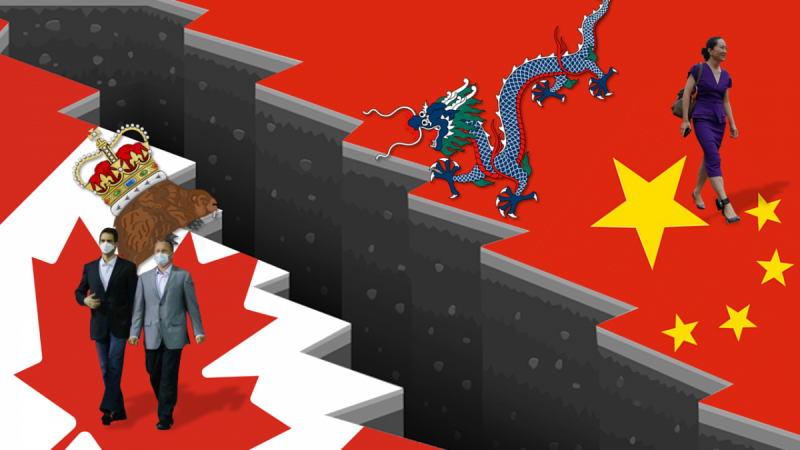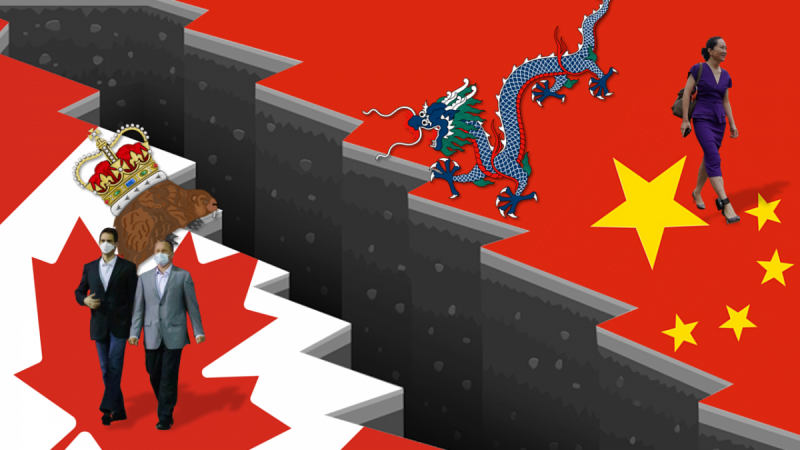The three Ms are free. What now?

The saga of Meng Wanzhou and the two Michaels was an irritant at a time when the Biden-led US administration is looking to shore up support to isolate China and defend its empire in Asia. Image by Canadian Dimension.
Meng Wanzhou flew back to China on the weekend, after signing a deferred prosecution agreement with US authorities on September 22. Her release from detention came nearly three years after Canadian authorities arrested her at the Vancouver International Airport based on a US deportation request.
Soon after, Michael Kovrig and Michael Spavor, accused of spying and held in a Chinese prison for more than 1,000 days, returned to Canada after being released from detention by Chinese authorities.
Jubilation greeted the arrivals of the three Ms on both sides of the Pacific.
Editorial opinion in Canada and elsewhere regarding the swap has been all over the map. Some have suggested that Biden has “rewarded Xi’s hostage diplomacy,” while others have written that the Chinese president has shown his weakness.
The agreement between US authorities and Meng includes two sections—a nine-point deferred prosecution agreement and a statement of facts. The former basically defers prosecution of Meng for four years starting from the date of her arrest until December 2022, with all charges to be dismissed at that time. Meng pleaded ‘not guilty’ to the charges.
With the signing of the agreement and ratification by the court, the US Department of Justice agreed to “promptly notify the Minister of Justice of Canada that it is withdrawing its request for Meng’s extradition.”
While pleading ‘not guilty,’ Meng “knowingly and voluntarily” agreed to a statement of facts that “are true and accurate to the best of her information and belief,” and waived any claim of relief or damages for her detention.
This statement of facts boils down to Meng admitting that she had stretched the truth about the relationship between Huawei and Skycomm by describing the latter as a partner instead of a subsidiary of Huawei in a 2013 meeting with an unspecified financial institution, believed to be the Hongkong and Shanghai Banking Corporation, a subsidiary of London-based HSBC Holdings PLC.
More revealing, however, is the ‘why’ to Meng’s admission. The same statement reveals that Huawei contracted with and paid, “in US dollars and cleared through the United States,” a British staffing company to send engineers to help Skycomm develop Iran’s telecommunications network. Such transactions were “in violation of the US Department of Treasury’s Office of Foreign Assets Control’s Iranian Transactions and Sanctions Regulations, 31 C.F.R. Part 560.”
What the facts actually attest is that Meng, representing Huawei, tried to get around arbitrary US sanctions against Iran. These sanctions were lifted by Obama in 2015 as part of an international agreement to monitor Iran’s nuclear program—known as the Joint Comprehensive Plan of Action (JCPOA)—but then reimposed by Trump when he came to power in 2017.
As many have claimed, Meng was the victim of Trump’s arbitrary move to tear up an international agreement and impose sanctions that even Human Rights Watch has characterized as harmful.
Most of the international community, including Canada, refused to endorse US sanctions against Iraq. The Trudeau government’s decision to enforce the US deportation request was an incredible blunder and can only be characterized as cowardly—an attempt to keep Trump happy and avoid friction with Canada’s biggest trading partner.
As explained previously, the supposed crimes of Meng were committed outside the US. The statement of facts affirms that this was the case and reveals that the US charges arose because Huawei’s economic transactions were denominated in US dollars “that cleared through the United States.” This is imperial over-reach at its worst and supports the statement of the Cross-Canada Campaign to Free Meng Wanzhou that the US request to extradite Meng is a case of extraterritoriality—imposing a state’s laws on other countries—a pillar of colonial-era unequal treaties imposed on China and many other countries.
Why now?
The attempt to extradite Meng, resulting in the imprisonment of Kovrig and Spavor, was a Trump-era initiative with little support among US allies.
The detention of the two Michaels upped the ante, and the Canadian government worked its diplomatic channels to maximize pressure for the release of Kovrig and Spavor. The deferred prosecution agreement, with the supposed confession of wrongdoing by Meng, was a face-saving mechanism that allowed Biden to rid himself of the extradition request and obtain the release of Kovrig and Spavor.
The dispute was an irritant at a time when the Biden-led US administration is looking to shore up support to isolate China and defend its empire in Asia. While some have referred to recent US policies as a “New Cold War” such a moniker may not be suitable since there is not much new or ‘cold’ in its policies—present or past.
US containment policies that arose in the Second World War led not to a cold war but to ‘hot’ ones and the deaths of millions in Japan, Korea and Vietnam, a topic dealt with in some detail in Orienting Canada: Race, Empire and the Transpacific.
In the 1980s, US policymakers hoped that promoting capitalism in China would undermine the communist regime. It instead gave birth to a new global competitor spurring US regimes, from Obama to Biden, to bolster their Pacific presence, particularly through military means.
Faced with the fallout from the abject failure of the US (and Canadian) war in Afghanistan, the Biden regime didn’t need the grief arising from the Meng affair when it was trying to build support for further military encirclement of China through the Quad (the military alliance of the US, Australia, Japan, and India) against China.
This has not proved such an easy feat. Its recent move to push through a tripartite deal (US-UK-Australia or AUKUS) to build nuclear submarines for Australia for use against China has run up against major backlash, particularly from France who lost a contract with Australia to build conventional submarines. France has protested by recalling its ambassadors to Australia and the US.
In the US as well, opposition to US policies in the Pacific is growing as organizations such as the newly formed Committee for a Sane US-China Policy actively educate US citizens. But it is a hard slog not helped by Chinese policies that have thwarted reform movements.
If, as Bishop University’s David Webster suggests, China’s actions in this affair highlight its search for the same global privileges as the United States, we need to rethink the emerging world order. It is not good enough to side with China because the modern Chinese nation emerged in a just struggle against imperialism, or simply because China opposes the US empire.
The Chinese state today wields enormous power, economic and coercive, and how it uses that power matters. As the war drums beat on, in Canada and elsewhere, misinformation will proliferate and the danger of conflict, nuclear or otherwise, will also escalate.
Finding a path for peace is possible but not easy given that the world is already facing a climate crisis, an enduring pandemic, and the continuing effects of two centuries of settler colonialism.
John Price is professor emeritus at the University of Victoria, author of Orienting Canada, and a member of the Advisory Board of the newly formed Canada-China Focus, a project of the Canadian Foreign Policy Institute and the Centre for Global Studies (University of Victoria).

